
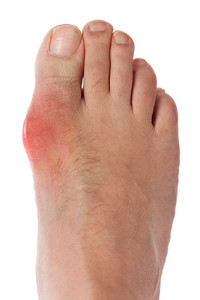 Gout results from sharp crystals being formed when there is an abundance of uric acid in the blood. The big toe is usually the first place for this to happen, although, if not treated, it may spread to other joint areas like the knee or elbow. If there is tenderness or stiffness in the joint, this could potentially be a sign of gout. Using ice on the affected joint and drinking plenty of water can help to reduce symptoms. If you think that you might have gout, a podiatrist will be able to properly diagnose you and lead you on the path to recovery and future prevention.
Gout results from sharp crystals being formed when there is an abundance of uric acid in the blood. The big toe is usually the first place for this to happen, although, if not treated, it may spread to other joint areas like the knee or elbow. If there is tenderness or stiffness in the joint, this could potentially be a sign of gout. Using ice on the affected joint and drinking plenty of water can help to reduce symptoms. If you think that you might have gout, a podiatrist will be able to properly diagnose you and lead you on the path to recovery and future prevention.
Gout is a foot condition that requires certain treatment and care. If you are seeking treatment, contact Dr. Russell J. Ellicott from Augusta Foot Center. Dr. Ellicott will treat your foot and ankle needs.
What is Gout?
Gout is a type of arthritis caused by a buildup of uric acid in the bloodstream. It often develops in the foot, especially the big toe area, although it can manifest in other parts of the body as well. Gout can make walking and standing very painful and is especially common in diabetics and the obese.
People typically get gout because of a poor diet. Genetic predisposition is also a factor. The children of parents who have had gout frequently have a chance of developing it themselves.
Gout can easily be identified by redness and inflammation of the big toe and the surrounding areas of the foot. Other symptoms include extreme fatigue, joint pain, and running high fevers. Sometimes corticosteroid drugs can be prescribed to treat gout, but the best way to combat this disease is to get more exercise and eat a better diet.
If you have any questions please feel free to contact our office located in Augusta, GA. We offer the newest diagnostic and treatment technologies for all your foot and ankle needs.
Read more about Everything You Need to Know About Gout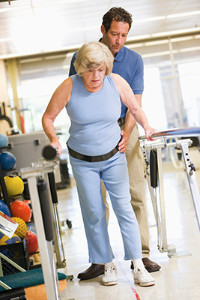 Aging experts say that telling the elderly to take it easy and not exercise is bad for their long-term health. Many believe that aging causes a loss of strength and fitness, but some experts say it is actually the opposite. The elderly have an increased risk of falling due to slower reaction times and decreased fitness. Encouraging the elderly to find activities that promote exercise and to follow a good diet can help decrease the risk of falls. If you are older and wish to start exercising, check with a doctor to see if it is right for you.
Aging experts say that telling the elderly to take it easy and not exercise is bad for their long-term health. Many believe that aging causes a loss of strength and fitness, but some experts say it is actually the opposite. The elderly have an increased risk of falling due to slower reaction times and decreased fitness. Encouraging the elderly to find activities that promote exercise and to follow a good diet can help decrease the risk of falls. If you are older and wish to start exercising, check with a doctor to see if it is right for you.
Preventing falls among the elderly is very important. If you are older and have fallen or fear that you are prone to falling, consult with Dr. Russell J. Ellicott from Augusta Foot Center. Dr. Ellicott will assess your condition and provide you with quality advice and care.
Every 11 seconds, an elderly American is being treated in an emergency room for a fall related injury. Falls are the leading cause of head and hip injuries for those 65 and older. Due to decreases in strength, balance, senses, and lack of awareness, elderly persons are very susceptible to falling. Thankfully, there are a number of things older persons can do to prevent falls.
How to Prevent Falls
Some effective methods that older persons can do to prevent falls include:
Falling can be a traumatic and embarrassing experience for elderly persons; this can make them less willing to leave the house, and less willing to talk to someone about their fears of falling. Doing such things, however, will increase the likelihood of tripping or losing one’s balance. Knowing the causes of falling and how to prevent them is the best way to mitigate the risk of serious injury.
If you have any questions, please feel free to contact our office located in Augusta, GA. We offer the newest diagnostic and treatment technologies for all your foot care needs.
Read more about Falls Prevention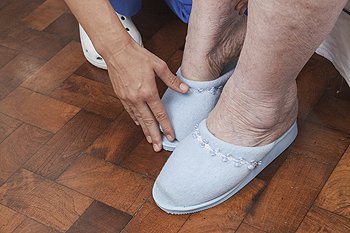 As we get older, our feet typically get larger and flatten out. This is due to a loss of elasticity in supporting tendons and ligaments, which then causes lower arches and an elongation of the sole. Many people do not realize this and wind up wearing the same size shoes which can now be too tight. Poorly fitted shoes can cause a number of foot ailments such as ingrown toenails, hammertoes, and foot pain. They can also exacerbate other foot problems, such as bunions. With this in mind, elderly persons should have their foot size examined when they are looking for a new pair of shoes. It is also best to go later on in the day when shopping as our feet tend to swell up throughout the day. Shoes should provide good cushioning and support and the toes should be able to move freely without being constricted.
As we get older, our feet typically get larger and flatten out. This is due to a loss of elasticity in supporting tendons and ligaments, which then causes lower arches and an elongation of the sole. Many people do not realize this and wind up wearing the same size shoes which can now be too tight. Poorly fitted shoes can cause a number of foot ailments such as ingrown toenails, hammertoes, and foot pain. They can also exacerbate other foot problems, such as bunions. With this in mind, elderly persons should have their foot size examined when they are looking for a new pair of shoes. It is also best to go later on in the day when shopping as our feet tend to swell up throughout the day. Shoes should provide good cushioning and support and the toes should be able to move freely without being constricted.
Proper foot care is something many older adults forget to consider. If you have any concerns about your feet and ankles, contact Dr. Russell J. Ellicott from Augusta Foot Center. Dr. Ellicott can provide the care you need to keep you pain-free and on your feet.
The Elderly and their Feet
As we age we start to notice many changes in our body, but the elder population may not notice them right away. Medical conditions may prevent the elderly to take notice of their foot health right away. Poor vision is a lead contributor to not taking action for the elderly.
Common Conditions
Susceptible Infections
Diabetes and poor circulation can cause general loss of sensitivity over the years, turning a simple cut into a serious issue.
If you have any questions please feel free to contact our office located in Augusta, GA. We offer the newest diagnostic and treatment technologies for all your foot and ankle needs.
Read more about Elderly and their Feet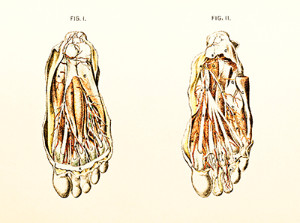 Have your feet ever felt numb while you were working out? If so, then you may have experienced paresthesia, a numbness or prickling sensation that many people have temporarily experienced in their life. It is often described as a “pins and needles” sensation that usually goes away once the position of the body changes. Paresthesia is usually caused by a pinched nerve or reduced blood flow to a part of the body. When it comes to working out, the exercises we do can put our body in positions that may reduce blood flow. In other cases, the muscles can swell due to increased blood flow from exercising. Paresthesia is usually a normal condition and often goes away. Not everyone will experience paresthesia or foot swelling, and in most cases it isn’t serious. If, however, your feet have swollen up, feel numb, or you experience pain that doesn’t go away, it is recommended to see a podiatrist.
Have your feet ever felt numb while you were working out? If so, then you may have experienced paresthesia, a numbness or prickling sensation that many people have temporarily experienced in their life. It is often described as a “pins and needles” sensation that usually goes away once the position of the body changes. Paresthesia is usually caused by a pinched nerve or reduced blood flow to a part of the body. When it comes to working out, the exercises we do can put our body in positions that may reduce blood flow. In other cases, the muscles can swell due to increased blood flow from exercising. Paresthesia is usually a normal condition and often goes away. Not everyone will experience paresthesia or foot swelling, and in most cases it isn’t serious. If, however, your feet have swollen up, feel numb, or you experience pain that doesn’t go away, it is recommended to see a podiatrist.
Poor circulation is a serious condition and needs immediate medical attention. If you have any concerns with poor circulation in your feet contact Dr. Russell J. Ellicott of Augusta Foot Center. Dr. Ellicott will treat your foot and ankle needs.
Poor Circulation in the Feet
Poor blood circulation in the feet and legs is can be caused by peripheral artery disease (PAD), which is the result of a buildup of plaque in the arteries.
Plaque buildup or atherosclerosis results from excess calcium and cholesterol in the bloodstream. This can restrict the amount of blood which can flow through the arteries. Poor blood circulation in the feet and legs are sometimes caused by inflammation in the blood vessels, known as vasculitis.
Causes
Lack of oxygen and oxygen from poor blood circulation restricts muscle growth and development. It can also cause:
Those who have diabetes or smoke are at greatest risk for poor circulation, as are those who are over 50. If you have poor circulation in the feet and legs it may be caused by PAD, and is important to make changes to your lifestyle in order to reduce risk of getting a heart attack or stroke. Exercise and maintaining a healthy lifestyle will dramatically improve conditions.
As always, see a podiatrist as he or she will assist in finding a regimen that suits you. A podiatrist can also prescribe you any needed medication.
If you have any questions please feel free to contact our office located in Augusta, GA. We offer the newest diagnostic and treatment technologies for all your foot and ankle needs.
Read more about Causes, Symptoms, and Treatment of Poor Blood Circulation in the Feet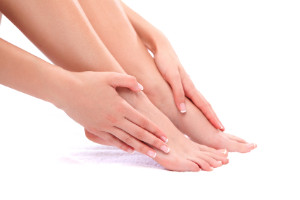 There are a great number of common foot ailments that can affect anyone. Here’s a small rundown on each and what to do about them. Plantar fasciitis, a common form of heel pain, is caused by the inflammation of the plantar fascia and generally occurs from overuse. Rest and wearing good footwear can help the pain go away, however, it is best to see a podiatrist for treatment. Flat feet are often treated by a podiatrist who can offer the best forms of appropriate treatment such as custom-made orthotics. Heel spurs are calcium deposits that form beneath the heel bones, potentially causing severe pain. Anti-inflammatory medications, exercise, and orthotics can help treat heel spurs; however, surgery may be necessary in some cases. Calluses, or thick patches of skin caused by friction, can be taken care of by eliminating sources of friction against the foot and moisturizing. For athletes and runners, spraining and straining the foot are always a possibility. Icing the foot, rest, and seeing a podiatrist are the best methods of treatment. Bunions are bony protrusions at the base of the big toe and can be exacerbated by poor footwear, such as heels. Once again, seeing a podiatrist is the best way to get treatment. Finally, ingrown toenails are a common condition and can be prevented by cutting your nails straight across and wearing shoes that give the toes ample space to move.
There are a great number of common foot ailments that can affect anyone. Here’s a small rundown on each and what to do about them. Plantar fasciitis, a common form of heel pain, is caused by the inflammation of the plantar fascia and generally occurs from overuse. Rest and wearing good footwear can help the pain go away, however, it is best to see a podiatrist for treatment. Flat feet are often treated by a podiatrist who can offer the best forms of appropriate treatment such as custom-made orthotics. Heel spurs are calcium deposits that form beneath the heel bones, potentially causing severe pain. Anti-inflammatory medications, exercise, and orthotics can help treat heel spurs; however, surgery may be necessary in some cases. Calluses, or thick patches of skin caused by friction, can be taken care of by eliminating sources of friction against the foot and moisturizing. For athletes and runners, spraining and straining the foot are always a possibility. Icing the foot, rest, and seeing a podiatrist are the best methods of treatment. Bunions are bony protrusions at the base of the big toe and can be exacerbated by poor footwear, such as heels. Once again, seeing a podiatrist is the best way to get treatment. Finally, ingrown toenails are a common condition and can be prevented by cutting your nails straight across and wearing shoes that give the toes ample space to move.
Everyday foot care is very important to prevent infection and other foot ailments. If you need your feet checked, contact Dr. Russell J. Ellicott from Augusta Foot Center. Dr. Ellicott can provide the care you need to keep you pain-free and on your feet.
Everyday Foot Care
Often, people take care of their bodies, face and hair more so than they do for their feet. But the feet are a very important aspect of our bodies, and one that we should pay more attention to. Without our feet, we would not be able to perform most daily tasks.
It is best to check your feet regularly to make sure there are no new bruises or cuts that you may not have noticed before. For dry feet, moisturizer can easily be a remedy and can be applied as often as necessary to the affected areas. Wearing shoes that fit well can also help you maintain good foot health, as well as making it easier to walk and do daily activities without the stress or pain of ill-fitting shoes, high heels, or even flip flops. Wearing clean socks with closed shoes is important to ensure that sweat and bacteria do not accumulate within the shoe. Clean socks help to prevent Athlete’s foot, fungi problems, bad odors, and can absorb sweat.
If you have any questions please feel free to contact our office located in Augusta, GA. We offer the newest diagnostic and treatment technologies for all your foot and ankle needs.
Read more about Every Day Foot Care